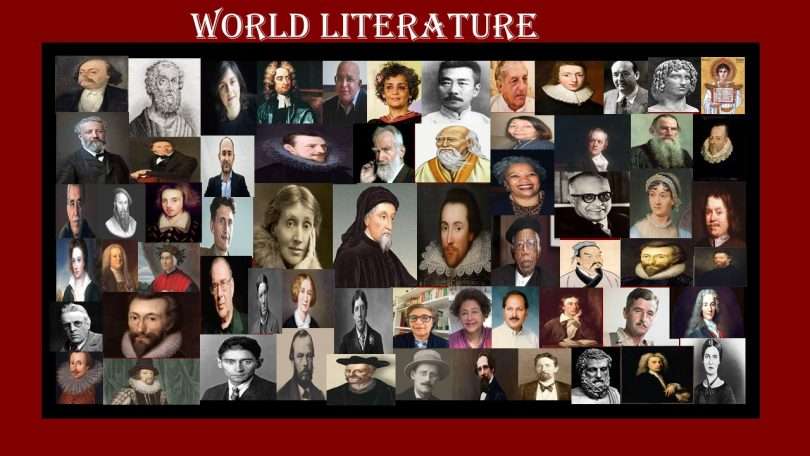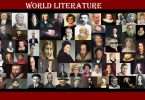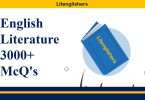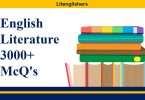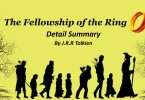Get a line to scrutinize the literature review and subpoena.
 What is Literature?
What is Literature?
“Literature broadly is the body of any bookkeeping, oral, or visual piece of work that uses ornamental language and brings on joy & aesthetic pleasure to the reader or it leads you to imagination, inventiveness, creativeness, and fantasy.”
Literature Review
Literature is commonly thought to mean the quixotic or imaginary construction of life, mirror/reflection of society/life, the study of sovereignty based on concoction (fiction), limitation of life, and a creative work of art that uses language as a medium of affirmation. Literature comes up with aesthetic pleasure rather than a practical or utilitarian aspiration so a Literature review is essential.
Literature = aesthetic work + intellectual excellence.
Solely put Literature enhances knowledge and communicates the experiences of life because it preserves history and culture as it gave us views on a particular work that belongs to a particular era or age. so when we study the work of different eras or ages it enables us to have a great grip on the historical preferences or person’s usages of different ages.
Literature in this way enhances your command of language and expands a person’s dialect, improves your diction, improves communication skills, and improves the course of action a person thinks and how does he speak? because literature hands over multiple perspectives of the same things. It means it aggrandizes (broadened) our vision or perception, encourages our critical thinking, fuels our imagination, boosts our imaginative thinking, and provides us with useful occupations in our free time by making us wiser and more crackerjack to judge, analyze and criticize.
Books negotiate with other subjects like History, Biography, Natural science, Religion, Politics, etc are considered literature reviews or literary works just for their notoriety of intellectual eminence amalgamate with the aesthetic worth in the form of style, composition, and general force of presentation. Some works of literature are considered canonical, and culturally represent a fleck of the genre like poetry, drama, and prose.
Etymology of literature:
The word “Literature” originates from the Latin word “Littera” and ” literature” which means letter. so we can say that writing forms with letters are called literature.
Latin(littera)→Latin(litteratura)→ French +English → Literature
The Sumerian civilization first developed writing around 3400B.C by the first female writer who lived in Enheduanna (an ancient “triple thread ” remarkable figure) in the 23rd century BCE in ancient Mesopotamia approximately 2285-2250 BCE making markings on clay tablets in a script known as as cuneiform.
Characteristics of Literature:
- Literature should have a theme, befitting content, and an idea because it provides direction.
- It should demonstrate the relevance of the theme because your work is based on the same subject and the same theme.
- Literature should have a compelling idea. your work or content is interesting and engages the audience.
- Literature should have a decorous style and proper grip on grammar because to write a work, a good style and grammatical skills are essential.
- Literature should sound authentic as what we see we present it, as it is in our work.
Types of Literature:
1. Pure Literature
2. Applied literature
- Pure Literature: we can say that any written work which we called literature only gives us aesthetic pleasure and the idea of his work dwell only in the author’s mind is known as pure literature. For instance: “ode on a Grecian urn” by John Keats.
- Applied Literature: Such kind of literature provides us with aesthetic pleasures, as well as knowledge, and the author put down his ideas on the notepaper from his mind is known as applied literature. For instance: in ‘The origin of species” by Darwin.
Literary fiction vs. Genre fiction :
1:Literary fiction:
Literary fiction spotlight the basic themes of human beings like expressing their condition by using symbolism and other literary devices just to express the author’s viewpoint. The main purpose of literary fiction is to know the inner conflicts and soulful thoughts of the characters and what kind of intimacy develops among them. and to what extent do they communicate with each other? what do they think about others by experiencing their relationships with others? Typically the main focus is on the central character who comes to realization and changes during that literary novel.
2: Genre fiction:
Genre fiction doesn’t gravitate to focus on the character’s inner reformation and development and doesn’t pay attention to the developing intimacy between the characters. Genre fiction is just read for clambake amusement and the escapism from life, from this society, from ourselves.
Genres of Literature:
There are four Genres of Literature.
| Drama | Drama has three sub-genres |
|
|
| Fiction | Fiction has eight subgenres |
|
|
| Non-Fiction | Nonfiction has five sub-genres |
|
|
| Poetry | Poetry has three sub-genres |
|
Literature as fine art:
The words possessing imaginative clout influence and provide you aesthetic pleasure or peace having conceptual or intellectual quality is known as fine art. Literature is fine just like music, dance, poetry, sculpture, painting, and architecture. Literature is appraised for its imagination, invitational, aesthetics, and by his intellectualism, which is why literature is reckoned with or considered fine art.
There are seven forms of fine arts:
- Music
- dance
- poetry
- painting
- literature
- sculpture
- architecture
What works are called Literature?
The works that portray pleasure and peace or the words that praised beauty in a textual form are the works of literature. Books dealing with other subjects like History, Biography, Natural science, Religion, Politics, etc. are considered literature or literary work just for their odor of intellectual prominence combined with the aesthetic worth pegged in the form of style, composition, and general force of presentation.
Why is literature important?
Literature is a kind of blueprint of human society. The work of literature gives us insight awareness and contact with all the world’s societies and ages. Does it portray almost all the aspects of our life like what our forefathers do? what are their traditions and norms? what are their views about the reformation of the society and what do for the reformation? What kind of tastes they have, their dressing sense, their eating style, their norms, traditions, their intellect every aspect of their life we get through literature in detail or the form of chunks.
It varies from one generation to the next. Through literature, we express generation-to-generation experiences that how and in what way they spread their voice to the world.
Frequently asked questions when we review literature
Who decides whether a book is literature or not? What becomes literature?
Literature is always going to be a debated term so technically all writing is literature that gave pleasure in one form or another or more precisely there is substandard literature out there but the question here is who determines which work is the literature. Literature has the supremacy of form or expression and expresses ideas of everlasting or ubiquitous engrossment. Publishers decide which work is a part of literature or not because they are the key figures to portray society according to their point of view, according to society’s point, and also what an individual thinks or feels.
Can only older works be called literature?
As literature describes the upgraded or amended crafts of masters belonging to different ages. Literature defies time boundaries so we can say that not only older works are considered a part and parcel of literature but all kinds of works that give us aesthetic pleasure or soulful satisfaction are considered to be a part of literature. Today millions of books are authorized but only some of them are regarded by critics or readers as literature.
Can detective stories be called literature?
Yes, detective stories are a popular type of literature because they give us aesthetic pleasure so we called them literature.
what is literature for the readers?
Literature is the expedition of one’s self as it represents the culture and tradition of a language or a people. For some readers, it is the inflated conformation of artistic expression, and artistic work and it provides the blueprint of human society. The ethnic group thinks that people who read literature have more affinity for others because literature puts the reader into another person’s shoes.
So to some extent, it leads you towards a better understanding, collaboration, and maintaining a harmonious environment. Readers feel a lofty kinship between humanity or those who are off to the beaten track and those who read the literature find solace when they knew that others have gone through the same things that they are expressing or have experienced. So we can say that it’s a kind of catharsis and a sense of relief to the readers.
Why do we read or review literature?
Reading or reviewing literature makes us look at the world through the eyes of others. it trains our minds on how to solve problems and creates a sense of understanding among people who belong to different classes, ages, or races.
What is literature as a source?
Literature is a source of information beyond the ages. It is the source of receiving and providing information swapping among writers and people who mainly focused on the society belonging to the ancient time. This source provider is of any shape like visual composition, books, letters, journals, and investigation reports.
what does literature invite us to share?
Literature invites us to share the views and sufferings of people belonging to different eras or ages just to create a sense of understanding among individuals. We share our thoughts with others and also understand what they are going through or what they suffer or want to do. People discuss their stories and then responses are shared between them. It is the one way for us to hear the voices of the past and work with the present.
why do we analyze or review literature?
The purpose of assessing literature is just to bespeak why the author used specific ideas, and why he choose such kinds of words or writing structure just to convey his/her message. It moves you away from those self-important statements that came across to find fault and little value in books that the author demur were great towards understanding.
How does it shape our understanding of the world and ourselves?
Do recipe books, item lists, or contact diaries part of the literature or not?
Recipe books and contact lists are works of literature because such writings don’t contain aesthetic worth or intellectual excellence.
What type of an expression does the literature review or portray?
Expression is a fundamental part of literature. It’s the action of making known one’s thoughts for feelings. Literature expresses the author’s experience of life as we know that the expression of life is the foremost subject matter of literature and has a broad scope as it includes all the experiences that man possibly could have. So we can say that there is life there is the possibility of the pure expression of the literature.
Readers’ intention and their tenderness toward the work
Experience is taken and gained from literature.
But to some extent we can say that expressions aren’t enough, the main thing is the reader’s intentions and their tenderness towards the written work or the writer’s intention because a writer communicates his/her experiences with the readers. So the vital thing is the understanding or that strong sense of communication between the writer and the reader.
Literature transfers experiences from the author to the readers to develop a great sense of commensalism and understanding that the same experiences live again strongly in the author’s mind and must live in the reader’s mind too.
When a writer writes his/her work or literature review then his or her main intention is on those points which are to be resolved or need to be revealed and the other point is what the writer experience so when a reader read a work he or experienced the same thing writer goes through. So overall we can say that a reader finds so many relatable aspects or chunks of works that relate to the writer’s life. There are chances that sometimes a writer’s full experience transfers to the reader and a sense of infatuation develop between the reader and the readers and a part and parcel of the writer’s experience are transferred.
It depends on the writer how he portrays his work in a fascinating manner or through his imaginative power to convey his thoughts to the readers. There is no limit to whether that writer’s experiences are reality base or sort of woolgathering or daydreaming the things thing matter. what he wants to say to the readers. what kind of content does he’s using? and how does his work create enthusiasm among the readers?
Other important literary works and MCQs
